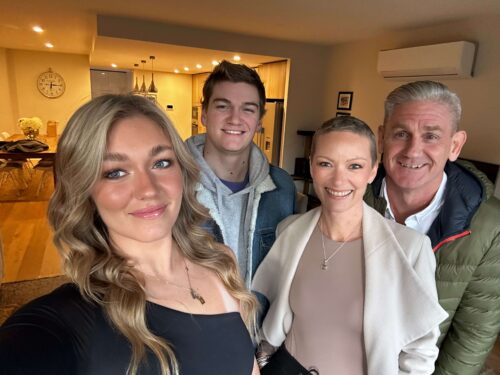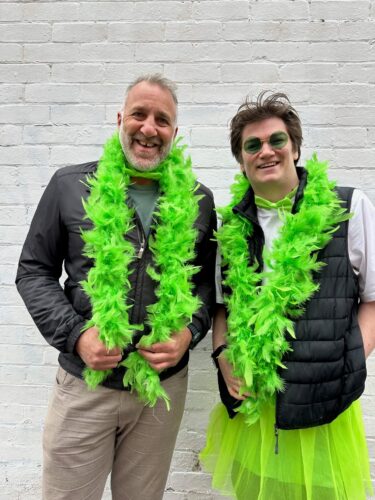The Discovery
I first noticed something wasn’t right one day at work when I caught my reflection in a mirror and saw a lump on my neck. It stopped me cold. I started poking at it, and it felt firm, unnervingly so. That same day, I booked an appointment with my GP. After a quick check, he didn’t hesitate: “You should get an ultrasound.”
The next day, I was lying there with gel on my neck, staring at the ceiling, trying not to panic. The nurse started off kind and reassuring, but as the ultrasound wand moved from my neck down to my chest, her tone shifted. Out of the corner of my eye, I caught the outline of a mass on the screen. I didn’t need a medical degree to know something was wrong. She couldn’t tell me the results, but her urgent tone said it all: “Please follow up with your GP immediately.”
Within the hour, I was back in my doctor’s office. He looked me in the eye and said I needed to go to the hospital straight away. I was given a choice: wait until tomorrow and face shorter lines or go now and deal with hours of waiting. I thought to myself: No way. I’m going now.
I sat in the emergency department for ten hours, masked, alone, and in the middle of COVID restrictions, until I was finally ushered in for more scans. Then, a nurse delivered the words that shattered my world: “It’s almost definitely cancer. We’ll need to do a biopsy.” It wasn’t just the news that hurt; it was the way she said it. Blunt. Cold. Stripped of all compassion. For a second, I convinced myself she must be wrong.
The biopsy came and went, and then the confirmation arrived: Hodgkin Lymphoma. The hardest part wasn’t hearing it myself; it was telling my family.
Only a few weeks earlier we sat down as a family, nothing out of the ordinary for us. Then devastation hit. Mum uttered the words “I have breast cancer”. Tears, hugs and a lot of denial followed. We were numb. Is this how I’m going to lose my mum? She’s so healthy, fit, barely done anything wrong in her life… How can this happen again? How am I going to tell my family?
I’ll never forget the day I called her and said simply: “You need to come home, I’ve got the results.” Dad and I sat on the couch talking for a moment and then Mum burst through the front door, running down the hallway, tears in her eyes, gasping: “What is it? What is it?” I caught her as she collapsed into me after I said the words: “It’s cancer.”
In that moment, I didn’t cry. I wasn’t in shock. I was locked in.
One goal, one thought burning in my mind: beat this f%cker.
The following week, both my Mum and I began chemotherapy, the doctors simply couldn’t believe it. Two family members starting chemotherapy the same week, two going through it together. Two different cancers, yet equally ruthless battles. What made it even harder for Mum was that, because of her own cancer treatment and the strict COVID hospital restrictions, she couldn’t be there with me for appointments, treatments, or hospital stays. As a mother, not being able to hold my hand, sit beside me, or simply show up for me was a pain beyond words.
Symptoms and Treatment
Looking back, it’s frustratingly obvious now that my body was screaming at me before the diagnosis. Night sweats, body aches, shortness of breath, extreme fatigue; I thought it was just lingering long COVID.
Treatment was brutal. I underwent both chemotherapy and radiation. Chemo was especially triggering to remember; the cold arm after the poison was pumped in, the unbearable nausea, dry mouth, constant fatigue, constipation that lasted two weeks, diarrhea was just some of the side effects. The mental battle was probably the worst. Without my motivation at the start to beat this thing, I’m not sure I would have made it to the end.
Challenges Along the Way
The emotional and mental battle was constant. The fear of relapse, the thought of dying, the why me moments; they all weighed heavily. Apart from my family, I didn’t receive much external support. There was no balance in my life at that point; my sole focus was my health and getting better.
Accessing treatment was fortunately straightforward. I had great resources and connections around me, so I didn’t have to travel or face major barriers in that way.
Staying Positive
My advice to anyone who hears those words “you have cancer” is to focus on the mental battle. Stay resilient, establish a routine, and set small goals you can tick off – each one is a win. Listen to your body: if you need to rest, rest. Don’t be afraid to ask for help and accept support; you don’t have to carry this alone.
Take advantage of services that can strengthen you – counselling, support programs, and remember there is zoom if you’re too unwell to attend in person. Workshops connect you with others who truly understand what you’re going through, reminding you that you’re not alone. Journalling can give you clarity and peace, even jotting down two things you’re grateful for each day builds strength. Most importantly, take it step by step: one day at a time, and on the hardest days, one hour at a time. Every step forward is progress.
Connection to Lymphoma Australia
Unfortunately, I only discovered Lymphoma Australia after my treatment had finished. At the time, I didn’t know the support that was out there, and looking back, I realise just how much it could have helped me. Now that I do know, it is a privilege to have been asked to be involved as an ambassador. Being part of the GO LIME campaign means so much to me. It’s not only about raising awareness, bringing people together, and putting both GO LIME and lymphoma in the limelight, but most of all, it’s about making sure no one has to face lymphoma feeling alone, the way I once did.
Where I Am Now
I’m in remission, and life has slowly started to return to normal. The journey has been intense, painful, and both emotionally and mentally exhausting, but I’ve come out the other side stronger, more in tune with my body, and more committed than ever to living a life full of purpose, passion and joy.